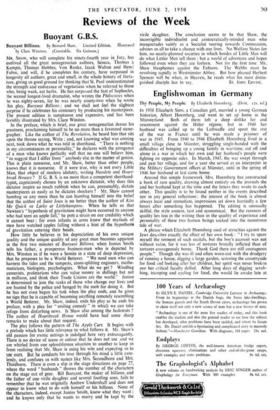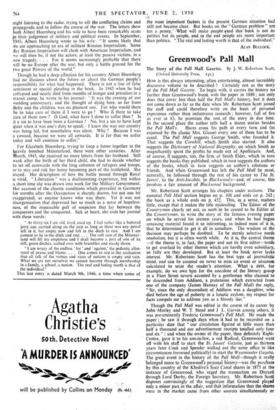Englishwoman in Germany
Thy People, My People. By Elizabeth Hoemberg. (Dent. 12s. 6d.)
IN 1938 Elizabeth Sims, a Canadian girl, married a young German historian, Albert Hoemberg, and went to set up home in the Mtinsterland. Both of them telt a deep dislike for and resentment against the Hitler regime, but in 1940 her husband was called up to the Luftwaffe and spent the rest of the war in France until he was made a prisoner of war in 1945. From 1940 to 1946 Elizabeth Hoemberg lived in a small village close to Munster, struggling single-handed with the difficulties of bringing up a young family in war-time, cut off and alone in a war in which her own and her husband's people were fighting on opposite sides. In March, 1945, the war swept through and past her village, and for a year she served as an interpreter in the Military Government offices at Munster, until in the spring of 1946 her husband at last came home.
Around this simple framework Mrs. Hoemberg has constructed a book of rare quality, drawing almost entirely on the journals she and her husband kept at the time and the letters they wrote to each other. This quality is to be found neither in the events described nor in any general reflections ; the interest of the book is almost always local and immediate, impressions set down hurriedly a few hours after something has happened. The editing is unusually skilful, the style austere, taut and economical. But the rareness of quality lies less in the writing than in the quality of experience and personality of these two human beings sucked into the monstrous tide of war.
A phrase which Elizabeth Hoemberg used of atrocities against the Jews describes exactly the effect of her own book : " I try to spare myself the torment of such recitals, but the boy's account was not without value, for it was less of tortures brutally inflicted than of tortures courageously borne. Thank God there are still courageous people." Though she was ill and often worn-out with the drudgery of running a house, digging a large garden, scouring the countryside for food and looking after her children, her spirit was never broken nor her critical faculty dulled. After long days of digging scrub- bing, tramping and cycling for food, she would lie awake late at night listening to the radio, trying to sift the conflicting claims and propaganda and to follow the course of the war. The letters show both Albert Hoemberg and his wife to have been remarkably acute in their judgement of military and political events. In September, 1943, Albert Hoemberg wrote to his wife: " It seems likely that itie are approaching an era of militant Russian Imperialism. Some day Russian Imperialism will clash with American Imperialism, and we will then be, if not the actors, at least the passive victims, in a new tragedy. . . . For it seems increasingly probable that there will be•no Europe after the war, but only a battle ground for the two great Powers of the world."
Though he had a deep affection for his country Albert Hoemberg had no illusions about the future or about the German people's responsibility for what had happened. There is not a line of false sentiment or special pleading in the book. In 1945 when he had collapsed and nearly died from months of hunger and privation in a transit camp, he wrote in his journal: " It was the evening of our wedding anniversary, and the thought of dying here, so far from Betty and the children, was no pleasant one. For who would there be to take care of them if I were to go ? Who it there to take care of them now ? 0 God, what have I done to suffer thus ? Is it a sin to have been born a German ? No, but a sin to have kept quiet when it was one's duty to speak. I knew the way our country was being led, but nonetheless was silent. Why ? Because I was a- coward, because we were all cowards. It is for that we suffer today and will continue to suffer."
For Elizabeth Hoemberg, trying to keep a home together in the !wavily bombed MiInsterland, there were other anxieties. After March, 1945, she received no more letters from her husband. Still weak after the birth of her third child, she had to decide whether to set off eastwards with the long columns of refugees and troops, or to stay and risk her home becoming part of the battlefield. She stayed. Her description of how the battle passed through Roxel is vivid. " Liberation" was a disillusioning experience, but within a short time she was drawn into work for the Military Government. Her account of the chaotic conditions which prevailed in Germany foil- months after the Occupation is sharply drawn, but not one bit exaggerated, as anyone knows who was there. Yet it was not disorganisation that depressed her so much as a sense of hopeless- ness, of the impassable gulf of suspicion that lay between the conquerors and the conquered. Sick at heart, she ends her journal with these words: " At thirty-six I am old, tired, used up. I feel rather like a battered jerry can, carried along on the jeep as long as there was any petrol left in it, but empty now and left in the ditch to rust. And I am content to lie in the ditch and rust.... The soft rain of the Munster- land will fill my emptiness and I shall become a part of one of its still, green ditches, arched over with brambles and sturdy thorn.
" I am weary of the endless ' for ' and against,' the pedantic allot- ment of praise and blame. ... One comes to rest in the realisation that all talk of the virtues and vices of nations is empty and vain. What we are not ourselves we cannot become through membership in a family, a school, a nation. The real and lasting worth is that of
the individual." • This last entry is dated March 9th, 1946, a time when some of the most important factors in the present German situation had still not become clear. But books on the " German problem " are ten a penny.° What will make people stead this book is not its politics but its people, and in the end people are more important than politics. ".The real and lasting worth is that of the individual."
ALAN BULLOCK.



































 Previous page
Previous page